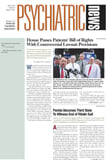Although a number of different programs have sprung up in the United States in recent years to help youth with drug problems, little research has been conducted to see whether such programs can make a difference. So Yih-Ing Hser, Ph.D., of the University of California at Los Angeles Drug Abuse Research Center and colleagues decided to launch an investigation.
The results of their study, which appear in the July Archives of General Psychiatry, suggest that such programs can make a difference.
They zeroed in on 1,167 adolescents being treated in three types of drug programs—418 in eight residential programs, 292 in nine outpatient drug-free programs, and 457 in six short-term inpatient programs. Altogether the programs represented 23 treatment programs in four cities—Chicago, Minneapolis, Pittsburgh, and Portland, Ore.
The researchers wanted to answer three questions about these subjects: What were their patterns of drug use and mental and behavioral problems before they entered the treatment programs? Did their drug use and mental and behavioral difficulties lessen after treatment? Was the length of their stay in treatment related to their posttreatment outcome?
As far as subjects’ status before starting treatment, 73 percent had been abusing drugs to such a degree that they were dependent on them. About 25 percent of the subjects had been multiple-drug users. Some 63 percent had also had a mental or behavioral disorder of some kind, such as a conduct disorder, depressive disorder, attention-deficit/hyperactivity disorder, an overanxious disorder, or panic disorder, and 67 percent of subjects had also engaged in criminal activity, which may or may not have resulted in arrests.
Overall, subjects significantly reduced their drug use in the year after treatment compared with the year before it, the investigators found. For example, weekly or more-frequent marijuana use dropped from 80 percent to 44 percent; heavy drinking, which the researchers defined as five or more drinks in a single sitting a least once a week, declined from 34 percent to 20 percent, and any use of other illicit drugs, including cocaine and hallucinogens, decreased from 48 percent to 42 percent
Subjects also experienced more positive psychological states after treatment than before, and participation in illegal acts decreased from 76 percent in the year before treatment to 53 percent in the year after. These improvements were observed across the three types of treatment programs.
As might be anticipated, longer treatment appeared to lead to more favorable outcomes than shorter treatment did, although treatment time was generally short—three-fourths of subjects received it for less than three months. The results did not reveal the minimum length of treatment necessary to obtain positive results.
The report, “An Evaluation of Drug Treatments for Adolescents in Four U.S. Cities,” is available online at http://archpsyc.ama-assn.org under the July issue. ▪
